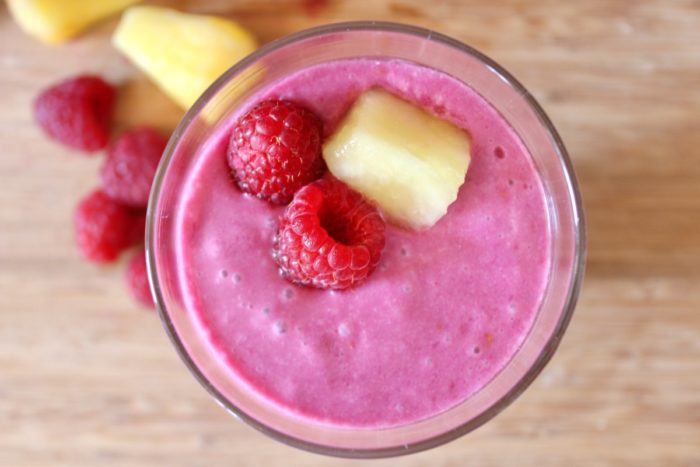This post contains affiliate links. There is no extra cost to you if you make a purchase, but I do recieve a commission.
Isn’t it fascinating how the foods we crave change with the seasons? When the leaves start changing colors I crave apples like a madman. Winter? Soups, broths, and hearty vegetables.
And when the spring and summer heat rolls around, I start loading up on fresh and frozen fruits and vegetables for refreshing smoothies.
Crohn’s disease and Ulcerative colitis can make it tricky to eat fresh fruits and vegetables. It’s easy to leave them out of your diet if you haven’t had good experiences with them, but that means missing out on vitamins, nutrients, and antioxidants!
I have found smoothies to be an effective way to tolerate more produce than I otherwise would if I were eating it fresh.

Vitamins, Antioxidants, & Enzymes, Oh My!
Raspberries
Raspberries are loaded with antioxidants that combat free radicals, which accelerate aging and contribute to chronic illnesses, cancer, Alzheimer’s disease, leaky gut, and more due to the oxidative stress they create in the body.
The ellagic acid in raspberries, which is an anti-inflammatory substance, has even been shown to improve the inflammatory effects of Crohn’s disease.
Pineapple
Pineapple also has antioxidants and is a fantastic source of Vitamin C. A special trait of pineapple is an enzyme called bromelain. This enzyme aids digestion by breaking down proteins. A little help in the digestion department is something I’ll always welcome with IBD!
Coconut Milk
And last but not least, coconut milk. I really love it. I’m especially fond of the thick, creamy goodness that comes out of the cans of full-fat coconut milk. Mmmm. Canned coconut milk is my favorite ingredient to produce the creamiest smoothies.
Coconut milk is a medium chain fatty acid, also called MCTs (medium chain triglycerides) for short. These kind of fatty acids are used for energy when they’re consumed and not stored, so there is no reason to fear that they will make you fat.
The MCTs in coconut can also lower inflammation, replace electrolytes, and helps to keep you full longer. These are are only a few of the benefits of coconut!
When possible, it’s best to buy coconut milk without added gums as they may be gut-irritants, such as this canned coconut milk.

Pro tip: Smoothies can be included in your meal prep! Just batch blend smoothies for the next day or two in a travel mug or mason jar.
I told you my favorite smoothie ingredient, so what’s yours?
Raspberry Pineapple Smoothie
Ingredients
2/3 cup fresh or frozen pineapple
1/2 cup fresh or frozen raspberries
1/2 cup liquid coconut milk
2 TBS full fat canned coconut milk (the thick part, not the watery liquid)
Instructions
Simply add all of the ingredients to a blender until there are no chunks remaining.
Notes
You may add more liquid coconut milk if you prefer your smoothie to be thinner, or more canned coconut milk for a thicker smoothie.







Yummy can’t wait to try this!